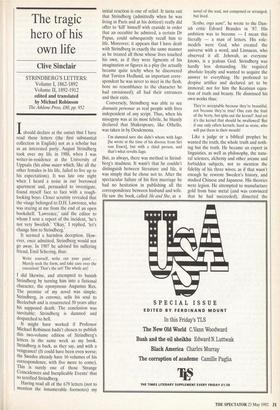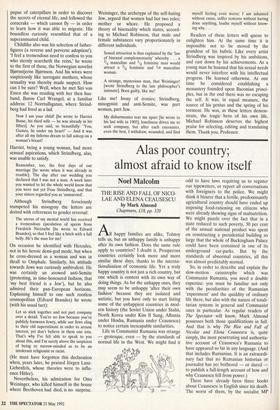The tragic hero of his own life
Clive Sinclair
STRINDBERG'S LETTERS: Volume I, 1862-1892 Volume II, 1892-1912 edited and translated by Michael Robinson The Athlone Press, £80, pp. 952 Ishould declare at the outset that I have read these letters (the first substantial collection in English) not as a scholar but as an interested party. August Strindberg took over my life in 1988, when I was writer-in-residence at the University of Uppsala (his alma mater which, like all the other females in his life, failed to live up to his expectations). It was late one night when I heard a noise in our borrowed apartment and, persuaded to investigate, found myself face to face with a rough- looking boyo. Closer scrutiny revealed that the visage belonged to D.H. Lawrence, who was staring at me from the end of an open bookshelf. 'Lawrence,' said the editor to whom I sent a report of the incident, 'he's not very Swedish.' Okay,' I replied, 'let's change him to Strindberg.'
It seemed a harmless deception. How- ever, once admitted, Strindberg would not go away. In 1907 he advised his suffering friend, Emil Schering, thus:
Write yourself, write out your pain! . Merely seek the form, and take care over the execution! That's the art! The whole art!
I did likewise, and attempted to banish Strindberg by turning him into a fictional character, the eponymous Augustus Rex. The premise of my novel was simple; Strindberg, in extremis, sells his soul to Beelzebub and is resurrected 50 years after his supposed death. The conclusion was inevitable; Strindberg is damned and despatched to hell.
It might have worked if Professor Michael Robinson hadn't chosen to publish this two-volume edition of Strindberg's letters in the same week as my book. Strindberg is back, as they say, and with a vengeance! (It could have been even worse; the Swedes already have 16 volumes of his correspondence, with five more to come). This is surely one of those 'Strange Coincidences and Inexplicable Events' that so terrified Strindberg. Having read all of the 679 letters (not to mention the innumerable footnotes) my initial reaction is one of relief. It turns out that Strindberg (admittedly when he was living in Paris and at his dottiest) really did offer to 'kill' himself with cyanide in order that an occultist he admired, a certain Dr Papus, could subsequently recall him to life. Moreover, it appears that I have dealt with Strindberg in exactly the same manner as he treated all those whose lives touched his own, as if they were figments of his imagination or figures in a play (he actually became quite tetchy when he discovered that Torsten Hedlund, an important corre- spondent he was never to meet in the flesh, bore no resemblance to the character he had envisioned); all had their entrances and their exits.
Conversely, Strindberg was able to see dramatis personae as real people with lives independent of any script. Thus, when his misogyny was at its most febrile, he bluntly declared that Shakespeare, like Othello, was taken in by Desdemona.
I'm damned sure she didn't whore with Iago [he wrote at the time of his divorce from Siri von Essen], but with a third person, and that's what revolts Iago.
But, as always, there was method in Strind- berg's madness. It wasn't that he couldn't distinguish between literature and life, it was simply that he chose not to. After the spectacular failure of his first marriage he had no hesitation in publishing all the correspondence between husband and wife. He saw the book, called He and She, as a
novel of the soul, not composed or arranged, but lived.
'Scribo, ergo sum!', he wrote to the Dan- ish critic Edvard Brandes in '87. His ambition was to become — I mean this literally — a man of letters. His role- models were God, who created the universe with a word, and Linnaeus, who observed it all. Jehovah, as everyone knows, is a jealous God. Strindberg was hardly less demanding. He required absolute loyalty and wanted to acquire the answer to everything. He professed to despise artifice and declared art to be immoral; not for him the Keatsian equa- tion of truth and beauty. He dismissed his own works thus:
They're acceptable because they're beautiful, not because they're true! One eats the fruit of the berry, but spits out the kernel! And yet it's the kernel that should be swallowed! But if one only offers kernels, hard as stone, who will put them in their mouth!
Like a judge or a biblical prophet he wanted the truth, the whole truth and noth- ing but the truth. He became an expert in linguistics, as well as philosophy, the natu- ral sciences, alchemy and other. arcane and forbidden subjects, not to mention the fidelity of his three wives; as if that wasn't enough he rewrote Sweden's history, and studied Chinese and Japanese. His theories were legion. He attempted to manufacture gold from base metal (and was convinced that he had succeeded), dissected the
pupae of caterpillars in order to discover the secrets of eternal life, and followed the corncrake — which cannot fly — in order to learn how it was able to migrate. His boundless curiosity resembled that of a superannuated child.
Childlike also was his selection of father- figures (a reverse and perverse adoption!). 'I feel a tremendous need to confess to you who sternly searcheth the reins,' he wrote to the first of these, the Norwegian novelist Bjornstjerne Bjornson. And his wives were suspiciously like surrogate mothers, whose sexuality was thereby made suspect. How can I be sure? Well, when he met Siri von Essen she was residing with her then hus- band, Baron Carl Wrangel, at a familiar address: 12 Norrtullsgatan, where Strind- berg had lived as a lad.
Now I am your child! [he wrote to Harriet Bosse, his third wife — he was already in his fifties]. As you said, so beautifully: 'You, Gusten, lie under my heart!' — And it was after all my Inferno dream to fall asleep on a woman's breast!
Harriet, being a young woman, had more sensual aspirations, which Strindberg, alas, was unable to satisfy.
Remember, too, the first days of our marriage [he wrote when it was already in trouble]. The day after our wedding you declared that I was not a man. A week later you wanted to let the whole world know that you were not yet Frau Strindberg, and that your sisters regarded you as 'unmarried'.
Although Strindberg ferociously trumpeted his misogyny the letters are dotted with references to gender reversal:
The uterus of my mental world has received a tremendous ejaculation of sperm from Friedrich Nietzsche [he wrote to Edvard Brandes], so that I feel like a bitch with a full belly. He's the man for me!
On occasion he identified with Hercules, not in his heroic demi-god mode, but when he cross-dressed as a woman and was in thrall to Omphale. Similarly, his attitude towards Jews was curiously ambivalent. He was certainly an avowed anti-Semite (protesting, in time-honoured fashion, that 'my best friend is a Jew'), but he also admired their pan-European horizons. Explaining himself to one such rootless cosmopolitan (Edvard Brandes) he wrote (with his usual tact):
Let us stick together and not part company over a detail. You're no Jew because you've publicly forsworn Jewry, while our Jews cling to their old superstitions in order to arouse interest, yet don't believe in them one iota. That's why I've felt able to speak to you about this, and I'm surely above the suspicion of being so narrow-minded as to be an intolerant religionist or racist.
(He must have forgotten this declaration when, years later, he praised JOrgen Lanz- Liebenfels, whose theories were to influ- ence Hitler).
Nevertheless, his admiration for Otto Weininger, who killed himself in the house where Beethoven had died, is no surprise. Weininger, the archetype of the self-hating Jew, argued that women had but two roles; mother or whore. He proposed a theory of bisexuality which states, accord- ing to Michael Robinson, that male and female substances vary proportionately in different individuals.
Sexual attraction is thus explained by the 'law of bisexual complementarity' whereby . . . a 3/4 masculine and 1/4 feminine man would attract a 3/4 feminine and 1/4 masculine woman.
A strange, mysterious man, that Weininger! [wrote Strindberg to the late philosopher's intimate]. Born guilty, like me!
Like me! Irony of ironies; Strindberg, misogynist and anti-Semite, was part woman, part Jew.
My disharmonies tear me apart [he wrote to his last wife in 1905], loneliness drives me to seek company, but after each encounter, even the best, I withdraw, wounded, and find myself feeling even worse: I am ashamed without cause, suffer remorse without having done anything, loathe myself without know- ing why ...
Readers of these letters will queue to enlighten him. At the same time it is impossible not to be moved by the grandeur of his hubris. Like every artist Strindberg was inspired by his ambitions, and cast down by his achievements. As a young man he boasted that his sexual needs would never interfere with his intellectual progress. He learned otherwise. At one time he considered establishing a monastery founded upon Baconian princi- ples, but in the end there was no escaping the self. It was, in equal measure, the source of his genius and the spring of his torment. He was, as these letters demon- strate, the tragic hero of his own life. Michael Robinson deserves the highest praise for selecting, editing and translating them. Thank you, Professor.



































































 Previous page
Previous page